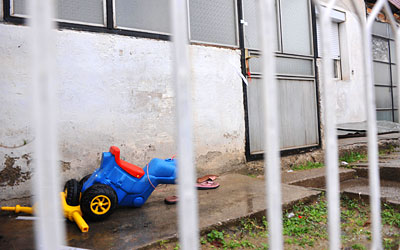Reaction to the brutal corporal punishment of the 7 year old child resulting with death 
The last case of beating a child that ended with death confirms our concerns and numerous reactions for more effective action by the Centers for social work, to have insight into dysfunctional families and families at risk, to supervise the exercise of the parental right, to take measures of temporary custody until the relations in the family can ensure children's safety and protection - that is a priority in the parental responsibility. The Centers for social work are taking away the parental rights only when severe injuries and consequences for children occur. That was the case this spring when the father had the right to see his two daughters (7 and 8 years old) and together with his friend was raping his children for three months, and in the current case the consequence is the cruel murder (parental negligence) of the child. The mechanism of taking away the parental rights after the accident happened, is just a punishment and not a prevention and protection that is supposed to give the child a secure children's development.
We call for prompt and appropriate responses from the Centers for social work which are necessary for the protection of many victims of domestic violence and in particular the young and helpless children's destinies.
The First Children's Embassy in the world has been appealing and alarming for several times that the corporal punishment against children in Macedonia is on the rise. Specifically, the data from the SOS telephone for children and youth 0800 12222 shows that compared with 2007, when the violence was present with 13.4% as a problem that children faced and had the courage to report it, is three times increased in 2008 when the corporal punishment and all forms of violence against children is represented with 32.5% of total calls. So far, our SOS telephone for the past 16 years registered calls from 17,407 children and adults that encountered specific problems.
The First Children's Embassy in the world - Megjashi conducted a research on the perception of citizens of Macedonia for corporal punishment of children. The same survey was conducted in 2005, which provided a comparative analysis. The data from these studies are reflecting the public perception of the presence of physical punishment as a style of education within the families in Macedonia. They show that in 2005 the respondents on average said that 44.9% of children in the country are physically punished within their families and in the 2009 survey respondents answered that 30.9% of children on average are punished within their family.
The reduction in the percentage representation of physical punishment is noticeable, but we still have a large percentage of this occurrence. The respondents were asked a question about their attitude towards the corporal punishment of children. About 2 / 3 of this year’s survey respondents said that corporal punishment of children should never be practiced (65.3%). Compared with the results obtained from the research conducted in 2005, on the same question, about 43% of the respondents reported that corporal punishment of children should never be practiced. Regarding the answer that physical punishment could be practiced if the parents themselves think it is effective, the data from the survey shows that in 2005 approximately 14% of the respondents separated this answer versus 1% responses in 2009. These results indicate an increase in the awareness among the citizens that the physical punishment of children is not a positive parental measure. That physical punishment of children should not be practiced, but in some cases it is justified, was indicated by 1 / 3 of the survey respondents in 2009. (33%) or about 5% less compared to the same response in the survey of 2005.
On our website you can look at the full report of the survey http://www.childrensembassy.org.mk/WBStorage/Files/Omnibus%20research_2009.pdf
|